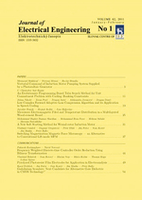
Journal of Electrical Engineering-Elektrotechnicky Casopis
Scope & Guideline
Elevating Standards in Electrical Engineering Research.
Introduction
Aims and Scopes
- Control Systems and Automation:
Research on control strategies, including PID controllers, adaptive control, and model predictive control, aimed at improving performance in various applications such as robotics, power systems, and industrial automation. - Signal Processing and Communications:
Studies focusing on signal processing techniques, communication protocols, and network systems, particularly in the context of wireless communications, IoT, and data transmission. - Power Electronics and Energy Systems:
Exploration of power converter designs, energy management systems, and renewable energy integration, emphasizing the optimization of electrical energy use and sustainability. - Sensors and Measurement Technologies:
Development and application of sensors for various measurement tasks, including temperature, pressure, and environmental monitoring, with a focus on enhancing accuracy and performance. - Nanotechnology and Advanced Materials:
Research on the application of nanomaterials in electrical engineering, including their use in sensors, energy devices, and electronic components, promoting innovative solutions for modern engineering challenges. - Machine Learning and Artificial Intelligence in Engineering:
Integration of machine learning and AI techniques in electrical engineering applications, ranging from predictive maintenance to intelligent control systems, enhancing operational efficiency and decision-making.
Trending and Emerging
- Smart Grids and Renewable Energy Integration:
There is a growing emphasis on research related to smart grids, energy management, and the integration of renewable energy sources, reflecting global trends towards sustainability and energy efficiency. - IoT and Sensor Networks:
Increased focus on Internet of Things (IoT) applications, including sensor networks and smart devices, showcases the journal's commitment to addressing modern connectivity challenges. - Artificial Intelligence and Machine Learning Applications:
The integration of AI and machine learning in various electrical engineering domains is trending, particularly in areas such as predictive maintenance, optimization, and intelligent systems. - Robotics and Automation Technologies:
Research in robotics, including control systems for robotic manipulators and automation in industrial settings, is gaining traction as industries seek to enhance efficiency and reduce labor costs. - Advanced Materials for Electrical Applications:
Emerging studies on nanomaterials and their applications in electrical engineering, particularly in sensors and energy devices, indicate a trend towards innovative material use in technology.
Declining or Waning
- Traditional Electromagnetics:
Research in classical electromagnetics, such as basic wave propagation and static field analysis, appears to be decreasing as newer technologies and applications emerge. - Analog Circuit Design:
There seems to be a waning interest in traditional analog circuit design topics, likely due to the increasing prevalence of digital solutions and integrated circuit technologies. - Basic Electrical Machine Theory:
Fundamental studies on electrical machines, while still important, are becoming less frequent as research trends lean towards advanced control strategies and smart grid technologies. - Conventional Power Systems Analysis:
Research focused on classical power systems analysis, such as load flow and short circuit studies, is declining as the field shifts towards smart grid and renewable energy integration. - Basic Communication Protocols:
The exploration of fundamental communication protocols is decreasing, as the field now emphasizes more complex systems and advanced networking technologies.
Similar Journals
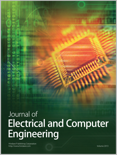
Journal of Electrical and Computer Engineering
Pioneering Insights in Electrical and Computer EngineeringJournal of Electrical and Computer Engineering is a premier open-access journal published by HINDAWI LTD, dedicated to advancing the fields of electrical and computer engineering. With an ISSN of 2090-0147 and an E-ISSN of 2090-0155, this journal has been providing a platform for cutting-edge research since its inception in 2007. Based in the United States, it operates from its address at ADAM HOUSE, 3RD FLR, 1 FITZROY SQ, LONDON W1T 5HF, ENGLAND. The journal has established itself with a healthy impact factor, classified in the 2023 Q2 quartile for both Computer Science (Miscellaneous) and Electrical and Electronic Engineering, demonstrating its growing influence in the academic community. Additionally, its ranking positions it within the 67th percentile in General Computer Science and the 61st percentile in Electrical and Electronic Engineering on Scopus, indicating its significant contribution to these fields. Covering an extensive scope from 2010 to 2024, the journal seeks to publish innovative research articles, reviews, and case studies that explore new techniques and applications in electrical and computer engineering, benefiting a wide audience of researchers, professionals, and students focused on these rapidly-evolving areas.

Elektronika Ir Elektrotechnika
Unlocking Potential in Engineering through Open AccessElektronika Ir Elektrotechnika is a premier academic journal dedicated to the field of electrical and electronic engineering, published by Kaunas University of Technology, Lithuania. With an Open Access model since 2004, this journal ensures that cutting-edge research is accessible to a global audience, facilitating the dissemination of knowledge and fostering innovation in the engineering community. The journal is currently categorized in the Q3 quartile for Electrical and Electronic Engineering as of 2023 and holds a Scopus ranking of #473 out of 797, placing it in the 40th percentile. Covering a diverse range of topics from emerging technologies to foundational research, Elektronika Ir Elektrotechnika serves as an invaluable resource for researchers, professionals, and students alike, supporting the advancement of both theoretical and practical aspects in electrical engineering. As we converge towards the years 2008 to 2024, the journal invites submissions that contribute to the evolving landscape of the discipline, aiming to inspire future innovations and collaborations.
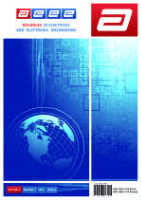
Advances in Electrical and Electronic Engineering
Connecting Research with Real-World Engineering SolutionsAdvances in Electrical and Electronic Engineering is a distinguished peer-reviewed journal published by VSB-TECHNICAL UNIVERSITY OSTRAVA, fostering an open-access platform since 2002 that is instrumental in disseminating innovative research and developments in the field of electrical and electronic engineering. With an ISSN of 1336-1376 and an E-ISSN of 1804-3119, this journal provides a vital resource for researchers, professionals, and students striving to stay at the forefront of this dynamic sector. Despite its present Q4 ranking in the Electrical and Electronic Engineering category and a Scopus rank of 598 out of 797, the journal aims to elevate its impact and reach through dedicated contributions that explore emerging technologies, theoretical advancements, and practical implementations. With its commitment to accessibility, authors are encouraged to publish work that can significantly advance our understanding of electrical systems and contribute to the global engineering community from its base in Czech Republic.

IEEE Open Journal of Industry Applications
Empowering innovation in engineering applications.IEEE Open Journal of Industry Applications is a premier open-access publication established in 2020 by the esteemed IEEE-INST ELECTRICAL ELECTRONICS ENGINEERS INC, dedicated to advancing the fields of Control and Systems Engineering, Electrical and Electronic Engineering, and Industrial and Manufacturing Engineering. With a strong commitment to disseminating high-quality research, the journal has rapidly garnered recognition, achieving a Q1 quartile ranking in multiple engineering categories, notably securing a rank of 21st out of 321 in Control and Systems Engineering and 26th out of 384 in Industrial and Manufacturing Engineering as of 2023. This journal not only facilitates immediate access to cutting-edge findings but also fosters an inclusive academic environment where researchers, professionals, and students can engage with and contribute to the evolving landscape of industry applications. By embracing open access, it ensures that pivotal research is freely available, thereby maximizing its impact on the scientific community. For potential contributors and readers, the journal's robust Scopus rankings—placing it in the top 7% of its fields—highlight its significance as a leading platform for innovative discussions and explorations in engineering.
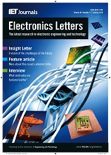
ELECTRONICS LETTERS
Unleashing the Potential of Electronics Innovations.ELECTRONICS LETTERS, published by WILEY, is a leading peer-reviewed journal dedicated to the field of Electrical and Electronic Engineering. With a rich history dating back to 1965, this journal serves as a prominent platform for disseminating novel research and innovations in electronics, covering topics such as circuit design, telecommunications, and signal processing. In 2021, the journal transitioned to an Open Access format, ensuring that cutting-edge research is freely accessible to a global audience, thereby enhancing its impact and outreach. The journal currently holds a Q3 quartile ranking in its category, reflecting its solid position among its peers, and ranks #451 out of 797 in Scopus for Electrical and Electronic Engineering, placing it within the 43rd percentile. ELECTRONICS LETTERS is essential for researchers, professionals, and students looking to stay abreast of the latest developments and contribute to advancements in the field, fostering collaboration and knowledge sharing in a rapidly evolving landscape.
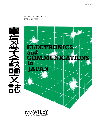
Electronics and Communications in Japan
Unlocking new horizons in electrical and electronic engineering.Electronics and Communications in Japan, published by WILEY, serves as a vital platform for researchers and practitioners in the fields of applied mathematics, electrical and electronic engineering, and computer networks and communications. With a focus on advancing the understanding and development of communication technologies, this journal has been disseminating valuable research since its inception in 1975, including significant contributions from 2008 to 2024. While it currently holds a Q4 ranking in several categories including Physics and Astronomy, Applied Mathematics, and Signal Processing, it offers an essential outlet for emerging ideas and practices in these disciplines. As an open-access journal, it ensures that cutting-edge research is accessible to a global audience, supporting collaboration and innovation within the academic community. With an ISSN of 1942-9533 and an E-ISSN of 1942-9541, Electronics and Communications in Japan not only contributes to the scholarly discourse but also plays a critical role in shaping the future of technology and communication.

Revue Roumaine des Sciences Techniques-Serie Electrotechnique et Energetique
Championing excellence in Electrical and Electronic research.Revue Roumaine des Sciences Techniques-Serie Electrotechnique et Energetique is a distinguished journal published by EDITURA ACAD ROMANE, focusing on the vital fields of Electrical and Electronic Engineering and Energy studies. With a notable history since its inception in 1969, this journal serves as a significant platform for disseminating research and advancements in these disciplines, particularly within the context of Romanian and broader European scientific communities. Although it operates on a traditional access model, it maintains relevance with a Q3 quartile ranking as of 2023 in both the Electrical and Electronic Engineering and Energy categories. With its inclusion in Scopus rankings indicating its growing influence, Revue Roumaine des Sciences Techniques actively contributes to the body of knowledge, providing valuable insights and fostering innovations that resonate with researchers, professionals, and students alike. The journal encourages submissions that address contemporary challenges and developments in technology and energy management, facilitating a collaborative exchange of knowledge that is crucial for both academic and practical applications.
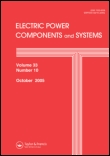
ELECTRIC POWER COMPONENTS AND SYSTEMS
Empowering Innovations in Power Systems ResearchELECTRIC POWER COMPONENTS AND SYSTEMS is a respected peer-reviewed journal dedicated to advancing the field of electrical and electronic engineering, energy engineering, and power technology. Published by Taylor & Francis Inc, this journal boasts a dynamic scope that encompasses a wide array of topics relevant to power systems, including renewable energy, power distribution, and component reliability. With an impact factor indicative of its ongoing contribution to research, it ranks in the Q3 category across multiple engineering disciplines according to the latest metrics. Researchers and professionals will find this journal an invaluable resource, offering insights into the latest developments and innovations in electric power systems from its inception in 2000 to the current era and beyond. Accessible online with Open Access options, it caters to both established experts and emerging scholars looking to deepen their knowledge and foster collaboration within this critical field.
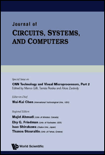
JOURNAL OF CIRCUITS SYSTEMS AND COMPUTERS
Pioneering Insights in Circuit Systems and Computer TechnologiesJOURNAL OF CIRCUITS SYSTEMS AND COMPUTERS is a pivotal publication in the fields of Electrical and Electronic Engineering as well as Hardware and Architecture, published by World Scientific Publishing Co. Pte Ltd in Singapore. With an ISSN of 0218-1266 and an E-ISSN of 1793-6454, this journal has contributed significantly to the discourse surrounding innovative research and technological advancements since its inception in the late 1990s. It currently holds a Q3 ranking in both relevant categories, reflecting its competitive stature and providing researchers, professionals, and students a substantial platform for disseminating findings. The journal covers a diverse range of topics, focusing on the design, analysis, and application of circuits, systems, and advanced computing technologies. Authors benefit from a rigorous peer-review process, ensuring high-quality publications that drive the field forward. The journal's commitment to excellence underscores its importance in fostering academic collaboration and knowledge exchange, making it a vital resource for anyone dedicated to advancing the domains of electrical engineering and computer science.

Electrical Control and Communication Engineering
Driving progress in electrical control and communication systems.Electrical Control and Communication Engineering is a premier Open Access journal dedicated to the vibrant fields of electrical engineering, control systems, and communication technologies. Published by SCIENDO, this journal not only aims to disseminate significant research findings since its inception in 2012 but also fosters a collaborative platform for researchers, professionals, and students from around the globe. With its commitment to high standards and rigorous peer review, the journal seeks to advance the collective understanding of innovative technologies and methodologies in electrical control and communication systems. With an ISSN of 2255-9140 and an E-ISSN of 2255-9159, the journal is gaining visibility and impact within the academic community, encouraging open and accessible scholarship to drive progress in this critical sector. Housed in Warsaw, Poland, it is poised to be an invaluable resource for those engaged in cutting-edge research and applications in electrical and communications engineering.